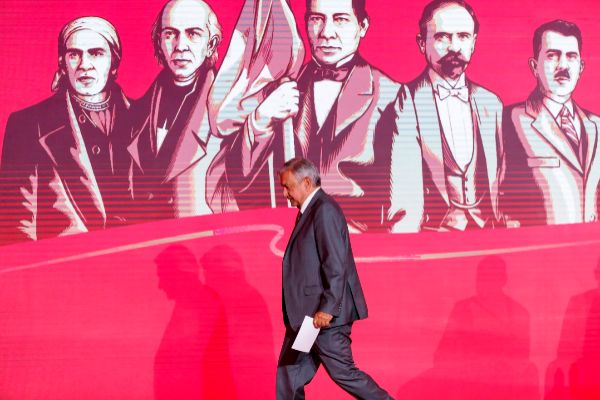- Mexico: The revolution of Andrés Manuel López Obrador 'takes root' in Mexico
- Mexico: López Obrador links the arrival of Hernán Cortés to Mexico with the origin of corruption in the country
A year ago, on December 1, 2018, Andrés Manuel López Obrador took a mass bath like the promised messiah of the Mexican left . "I have no right to fail them," said the newly elected president. Twelve months later, his "revolution" starts among critics, the enthusiasm of his faithful and the uncertainty of economic powers.
After two lost elections , where he denounced alleged fraud, López Obrador's party won the victory by presenting himself as "the hope of Mexico" and promoting a project that the president himself equated to historical moments such as the Mexican Revolution. The country has changed in a year, but López Obrador's expectations have come hopelessly in the face of the country's harsh reality .
Without knowing the data of November and December, it looks like 2019 will be the most violent year in the recent history of Mexico (with an average of 97 murders a day), while the economic outlook the promise of Lopez Obrador to grow 4% per year has been frustrated by the announcement that the National Institute of Geography and Statistics advanced last Monday: Mexico enters a technical recession after accumulating three consecutive quarters with GDP in decline .
In terms of security, the end of the narco war decreed by the president has not succeeded in reducing homicide rates and has also left the humiliating operative that ended, due to the demands of the Sinaloa cartel, with the release of the son of El Chapo Guzmán. However, López Obrador has created his promised National Guard in record time , a mixed force composed of police and military, who aspires to withdraw the criticized army from the streets.
With the fight against insecurity and the negative economic drift as great threats on the horizon, President López Obrador has fulfilled some of his promises. Starting to banish from the Presidency any vestige of past luxuries.
As soon as he took office, López Obrador cut his salary by 40%, he no longer moves in an official car (he uses a white Volkswagen of his property), nor does he travel on the presidential plane (he does it on commercial flights as a tourist) and does not He lives in the official residence of Los Pinos (now converted into a museum open to the morbid of the most curious).
The austerity also extends to senior officials with the aim of saving, as the president calculates, more than 25,000 million euros .
The fight against corruption is another of the assets that López Obrador hopes to exploit to raise more funds with which to reduce, at the same time, inequality in the second country with more millionaires in Latin America and where 50 million people live under the poverty line.
To date, it has approved several national scholarship programs for students and people over 65, as well as an infrastructure plan with which to bring investment to the impoverished south of the country. In parallel to these new projects, the president has also canceled others such as the new international airport of Mexico City (NAIM) , the star work of his predecessor Peña Nieto, whose construction was advanced by 30%.
López Obrador justified his decision on cost overruns and environmental damages, although the supposed savings could turn against him, since he will now have to face millionaire compensation for the affected companies.
The first year of López Obrador has been so intense that among the media that follow his activity they confess that "more than a year, they seem two". Political hyperactivity, omnipresence in daily press conferences and controversies, such as the letter to King Felipe VI apologizing for the Conquest , have marked the beginning of a six-year period that promises to be intense.
According to the criteria of The Trust Project
Know more- Mexico
- Volkswagen
Political crisis Bolivia asks Juan Guaidó to name ambassador to La Paz
Profile | Bolivian interim president Jeanine Áñez, an accidental presidency to end the 'Evo era'
Macroeconomics The Argentine economy, a puzzle for Fernández

